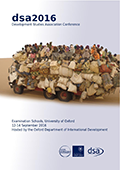On 6-7 October 2016, the Manchester Institute of Innovation Research and the ESRC Rising Powers and Interdependent Futures programme hosted a thematic workshop to discuss the roles of rising powers in shaping global innovation.
Our policy brief summarises the findings and practical implications that come out of different projects under the ESRC programme working on the theme of innovation.
 |
| How do Rising Powers Shape Global Innovation? |
Overall, the research
findings discussed at the workshop underline that the Rising Powers,
such as China, India, and Russia, represent one of the key drivers of global
economic and social change today. Notwithstanding recent short-run fluctuations
in economic growth, these Rising Powers are becoming increasingly important
players in global innovation. Non-Western models of innovation challenge
Western approaches to research and development in some areas, but also offer
opportunities for research cooperation and technology transfer.
The emergence of Rising Powers as global players in key
technologies, but also the need to look more closely at the differences between
them, can be seen from the findings
of our project on Innovation
Systems Development in China and Russia. Both China and Russia have undergone periods of market reform and developed new strategic goals for their innovation policies that show some parallels, for instance in the
field of nanotechnology. Despite
these similarities China appears to be more clearly on a path to becoming a
world-leading country on innovation than Russia. For the UK, innovation
developments in China, as well as in other Rising Powers countries, can present
new collaboration opportunities although they also heighten competition for
leadership and global market success in emerging and advanced technologies.
This is also apparent
from the research presented by our project at King’s College London on state strategiesof governance in global biomedical innovation in China and India. The
emergence of bioinformatics, meaning tools that make biology legible with the
help of computer science, is changing the way science works. This opens new
opportunities for Rising Power countries to establish themselves in this new
territory. Western models of innovation have dominated global research on
bioinformatics, but increasing engagement of Rising Powers such as China and
India in the area of bioinformatics could challenge established norms and
practices of research in Western countries. Effective regulation of biomedical research in the UK needs to take into account stem cell therapy in countries such as China and India, different emerging national and international governance approaches for innovation, as well as data and incentives issues.
Finally, looking beyond the Rising Powers’ impact on developed
country innovation systems, their investment in innovation offers opportunities
for South-South technology transfer and addressing key global development
challenges such as climate change. Our project based at SOAS explores these
dynamics in its comparativestudy of Chinese hydropower dams in Africa and Asia. Findings show that Chinese
investment into low carbon energy in developing countries offers opportunities
for technology transfer and mitigation of climate change. In addition, its
development impact could be further enhanced by strengthening social safeguards
and environmental impact assessments. Watch the video on the project's findings here:
As a collection, our
projects show that the Rising Powers’ engagement in innovation has a profound
impact beyond their borders, both in the UK and globally. Within the UK,
policies on research and innovation need to take innovation dynamics in
countries such as China, Russia, and India into account to be effective.
Globally, innovation and technology transfer from the Rising Powers has the
potential to address key policy challenges such as climate change, provided
that social and economic side effects of South-South investment projects are
dealt with effectively.
For more details, please refer to the full thematic policy brief on 'How do Rising Powers shape Global Innovation?' produced by the ESRC Rising Powers and Interdependent Futures programme.
For a more general overview of the findings of all 12 research projects under the Rising Powers and Interdependent Futures programme, please have a look at our briefing on 'How do Rising Powers Drive Global Change?'.
For a more general overview of the findings of all 12 research projects under the Rising Powers and Interdependent Futures programme, please have a look at our briefing on 'How do Rising Powers Drive Global Change?'.
